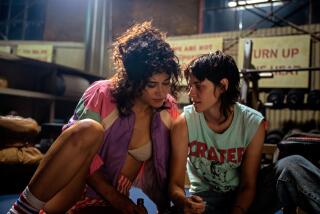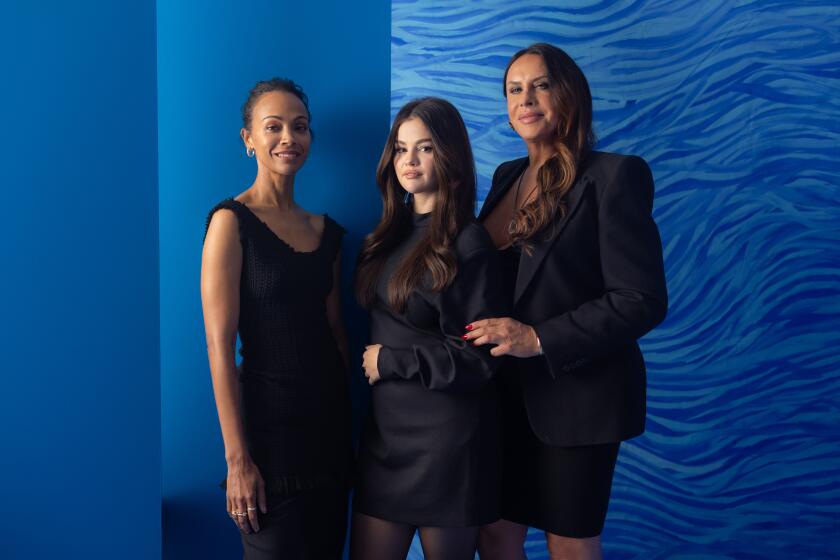Review: ‘The Lovely Bones’
By turns warmly sentimental, serial-killer sinister and science-fiction fantastical, “The Lovely Bones” was an unlikely book to achieve worldwide success. In the film version, those mismatched elements come back to haunt the story, so to speak, making the final product more hit-and-miss than unblemished triumph.
It wasn’t only the bestselling nature of Alice Sebold’s novel that made “Bones” one of the most anticipated films of the year. It was the participation of director Peter Jackson and his regular screenwriting collaborators Fran Walsh and Philippa Boyens, the team that had a considerable triumph with the “Lord of the Rings” trilogy.
And Jackson is successful re-creating parts of this story told by a 14-year-old girl who is savagely murdered in 1973 and then watches for years from a kind of in-between state that she calls “the blue horizon between heaven and earth” as her friends, her family and her killer go on about their lives.
His best move by far was casting young Irish actress Saoirse Ronan, Oscar-nominated for her compelling role in “ Atonement,” as the murdered Susie Salmon. An enormously gifted performer, Ronan is the only element of the film that is exactly as it should be, bringing naturalness, honesty and radiance to the part of a young woman just on the cusp of life.
Other elements, including “The Lovely Bones’ ” imaginative notion of what Susie’s afterlife looks like, are strong, but everything that’s good is undermined by an overemphasis on one part of the story that is essential but has been allowed to overflow its boundaries.
That would be the film’s decision to foreground its weirdest, creepiest, most shocking elements, starting with the decision to give a much more prominent role to murderer George Harvey. Expertly played by Stanley Tucci, so transformed by makeup as to be almost unrecognizable, Harvey is such an unsettling, toxic individual that the actor says he came close to turning down the role.
It’s not only Harvey that we see in sometimes grotesque detail, it’s the bizarre decorations of the underground murder site that we watch him ever so carefully plan and build, as well as the realistic bodies of his previous victims. And there is of course the chilling time the family spends trying to solve Susie’s murder.
Though it’s unfortunate, this focus will not be a shock to those who know Jackson’s films. The director (visible in an amusing cameo examining a movie camera in a shopping mall) began his career with a fondness for splatter-type material with titles like “Bad Taste” and “Braindead.” It may even be that the chance to fool around with this kind of stuff on a more high-tone level was one thing that drew the filmmaker to the novel in the first place.
But though it can be argued that these things, or versions of them, are key points in the novel, seeing them on the screen plays differently, disturbing the story’s balance. If Sebold’s ultimately soothing novel had focused this much on its off-putting aspects, it never would have found the huge audience it did.
Because the book was such a major success, “The Lovely Bones” pretty much had its choice of actors for key roles, and in selecting two strong performers, Mark Wahlberg and Rachel Weisz, as Susie’s father, Jack, and mother, Abigail, both devastated in their own ways by their daughter’s death, the film undeniably chose well.
But though both actors have their moments, the film’s erratic mixture of emotional tones, its decision to go back and forth from missing-Susie sadness to serial-killer sadism, undercuts their ability to give resonant performances.
Also hamstrung, but for a different reason, is Susan Sarandon as Grandma Lynn, who’s been encouraged to be too over the top for anyone’s good.
One element of the film that is consistently involving is the dreamscape look of the in-between world where Susie spends her time watching her murderer scheme, her sister Lindsey (Rose McIver) grow up and her parents fall apart. A field of barley that changes into a rolling ocean, huge versions of the ships-in-a-bottle that were her father’s hobby, roses blooming under frozen lakes, they all speak to a world, created by New Zealand’s Weta Digital and beautifully shot by cinematographer Andrew Lesnie, that is particular to Susie but special to us all.
Though “The Lovely Bones” never overcomes its tendency to push things too hard, there are moments, almost invariably involving star Ronan, that resonate with the book’s comforting notion of a sentient afterlife. To hear Susie speak the novel’s signature lines about “the lovely bones that had grown around my absence” as she comes to terms with “the world without me in it” is to feel what we’ve been wanting to feel for a long time. It’s also to wish that the entire film were as effective as these best moments, but that was not to be.
More to Read
Only good movies
Get the Indie Focus newsletter, Mark Olsen's weekly guide to the world of cinema.
You may occasionally receive promotional content from the Los Angeles Times.











